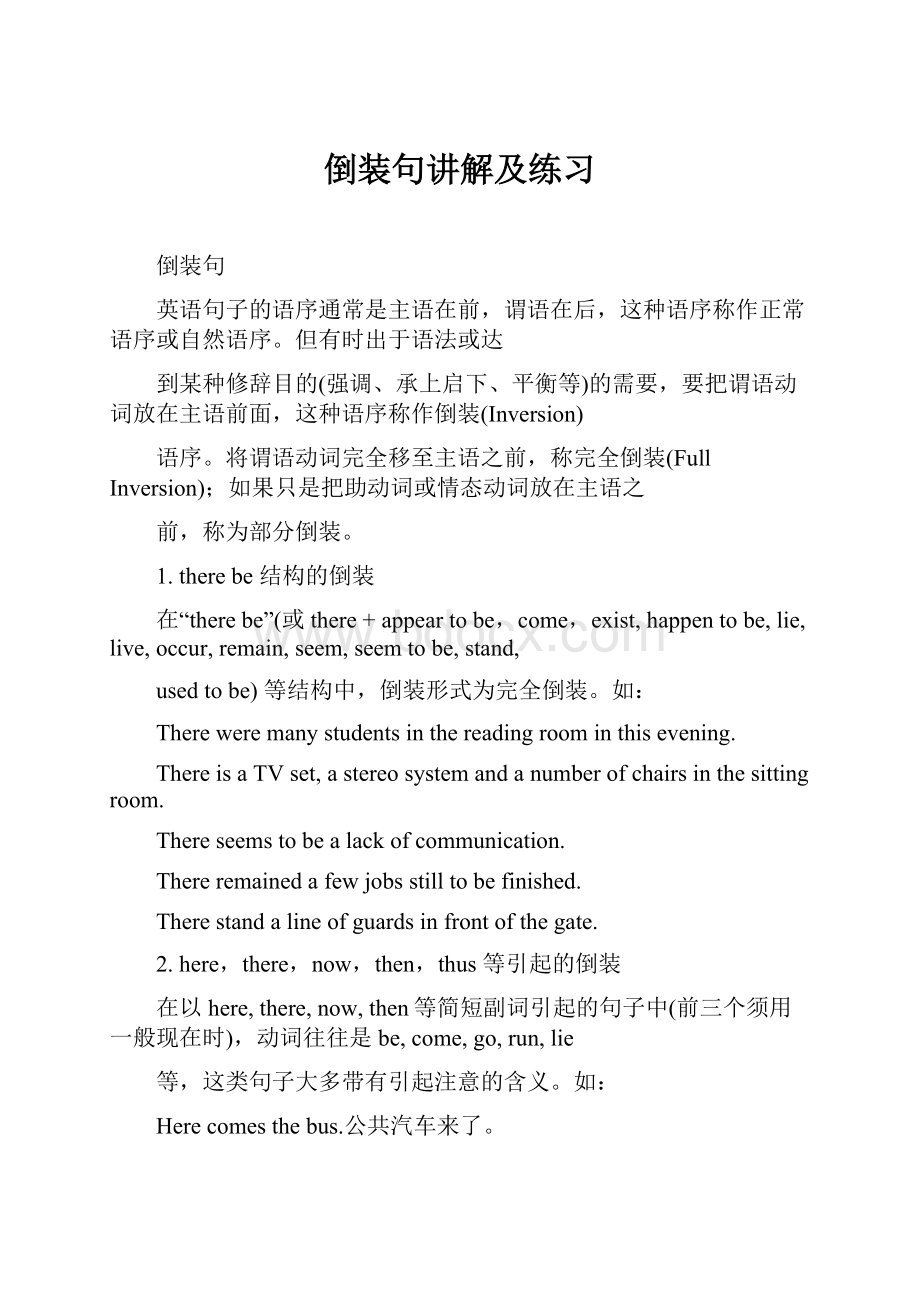倒装句讲解及练习.docx
《倒装句讲解及练习.docx》由会员分享,可在线阅读,更多相关《倒装句讲解及练习.docx(20页珍藏版)》请在冰豆网上搜索。

倒装句讲解及练习
倒装句
英语句子的语序通常是主语在前,谓语在后,这种语序称作正常语序或自然语序。
但有时出于语法或达
到某种修辞目的(强调、承上启下、平衡等)的需要,要把谓语动词放在主语前面,这种语序称作倒装(Inversion)
语序。
将谓语动词完全移至主语之前,称完全倒装(FullInversion);如果只是把助动词或情态动词放在主语之
前,称为部分倒装。
1.therebe结构的倒装
在“therebe”(或there+appeartobe,come,exist,happentobe,lie,live,occur,remain,seem,seemtobe,stand,
usedtobe)等结构中,倒装形式为完全倒装。
如:
Thereweremanystudentsinthereadingroominthisevening.
ThereisaTVset,astereosystemandanumberofchairsinthesittingroom.
Thereseemstobealackofcommunication.
Thereremainedafewjobsstilltobefinished.
Therestandalineofguardsinfrontofthegate.
2.here,there,now,then,thus等引起的倒装
在以here,there,now,then等简短副词引起的句子中(前三个须用一般现在时),动词往往是be,come,go,run,lie
等,这类句子大多带有引起注意的含义。
如:
Herecomesthebus.公共汽车来了。
Hereistheletteryouhavebeenlookingforwardto.你久盼的信在这儿。
Theregoesthebell.
但要注意:
如果主语是代词,则不用倒装。
如:
Heretheyare.他们在这儿。
3.省略if的非真实条件状语从句中的倒装
在虚拟结构中,条件从句的谓语含有were,had和should这三个词是,可省去if,将这些词移至主语之前。
HadItime(=IfIhadtime),Iwouldgoandhelpyou.
WereIyou(=IfIwereyou),Iwouldgoabroad.
Shouldhecome(=Ifheshouldcome),tellhimtoringmeup.
Hadyouworkedharderatcollege,youwouldhavegotbetterjob.
Werehebetterqualified,hewouldapplyfortheposition.
4.副词so,neither,nor等引起的倒装
在用so,nor,neither表示“也/不……”这一类结构里其公式是:
肯定:
so+be/have/助动词/情态动词+主语
否定:
Neither(nor)+be/have/助动词/情态动词+主语。
如:
—HehasbeentoBeijing.他去过北京。
—SohaveI.我也去过。
—Theycan’tanswerthequestion.他们不会回答这个问题。
—NeitherthanI.我也不会。
5.what,how引起的倒装
以What,how开头的感叹句(表语或宾语提前)。
如:
Whatbeautifulweather(itis)!
多好的天气啊!
(表语提前)
Whatalovelypicturehepainted!
他画了一张多好的画啊!
(宾语提前)
6.疑问词或连接词引起的倒装
在疑问词或连接词whether等引起的从句中。
如:
Whateveryoumaysay,Iwon’tgothere.无论你怎样说,我都不会去那儿。
(状语从句中宾语提前)
Whatbookhewantsisnotclear.他要什么书还不清楚。
(主语从句中宾语提前)
7.否定词位于句首时引起的倒装
(1).never,seldom,hardly,little,few等引起的倒装
否定词never,seldom,rarely,hardly,barely,scarcely,little,few等位于句首时所引起的倒装句通常为部
分倒装形式,如果谓语动词为be的一般现在时或一般过去时,则为完全倒装形式。
如:
NevershallIforgetthedayswhenyouwerewithus.
Littledoesherealizehowimportantthismeetingis.他对这个会议的重要性不甚了了。
Never/SeldomhastherebeensomuchprotestagainsttheBomb.
(2).nowhere,nolonger,nomore等引起的倒装
nowhere(无处),nolonger(不再),nomore(也不)等否定词位于句首时所引起的倒装句通常为部分倒装形式,如
果谓语动词为be的一般现在时或一般过去时,则为完全倒装形式:
Nolongerwasheinchargeofthiswork.他不再负责这项工作了。
NowhereisdrugabusemoreofaproblemthanintheUS.
'Shedidn'tknowthereasonforhisleaving.''NomoredoI(=neitherdoI).'
(3).notuntil,nota,notintheleast等引起的倒装
notuntil(直到……才),nota(一个……也没有),notintheleast(一点儿也不),notforaminute/moment(一点儿
也不)等位于句首时,通常引起倒装(nota之后的名词作主语时除外),其形式通常为部分倒装形式,如果谓语
动词为be的一般现在时或一般过去时,则为完全倒装形式。
如:
Notuntilallthedemandshadbeenturneddowndidtheworkersdecidetogoonstrike.
一直到所有的要求遭到拒绝之后,工人们才决定罢工。
Notoncedidhetalktome.他一次也没有和我谈过。
Notaworddidhesay.他一句话也没说。
NotintheleastamIafraidofyouanymore.
(4).undernocircumstances,bynomeans,innoway,atnotime等引起的倒装
in/undernocircumstances(无论如何不),bynomeans(决不),innocase(无论如何不),innoway(决不),onno
account(决不可),onnocondition(决不),atnotime(永不...,在任何时候都不)等短语位于句首时所引起的
倒装句通常为部分倒装形式,如果谓语动词为be的一般现在时或一般过去时,则为完全倒装形式。
如:
Innocasemustforceberesortedto.决不准许诉诸武力。
BynomeansisittruethatallEnglishpeopleknowtheirownlanguagewell.绝非所有的英国人都通晓本国语。
Atnotimedidanyoneinvolvedspeaktothepress.
Undernocircumstanceswouldhechangehismind.
Undernocircumstancesshouldyoulendhimanymoney.你无论如何都不该把钱借给他。
Onnoaccountmustyouacceptanymoneyifheoffersit.他如要给你钱,你可绝不能接受。
Innocaseshouldyougiveup.你绝不能放弃。
Onnoconditionshouldwetellheraboutit.我们绝不能把此事告诉她。
NowaywillIgoonworkingforthatman.我再也不给那个人工作了。
8.关联连词位于句首时引起的倒装
(1).notonly...butalso引起的倒装
notonly...butalso位于句首所引起的倒装句为部分倒装形式,如果谓语动词为be的一般现在时形式或一般过
去时形式,则为完全倒装形式。
如:
Notonlyshouldwenotbeafraidofdifficulties,butalsoweshouldtryourbesttoovercomethem.
我们不仅应该不怕困难,而且应该尽最大努力去克服它们。
Notonlydidhecome,buthesawher.他不仅来了,而且还见到了她。
NotonlydoesshespeakSpanish,(but)shealsoknowshowtotype.她不但会说西班牙语,还会打字呢。
Notonlyisheateacher,butheisalsoapoet.他不仅是一位教师,而且是一位诗人。
Notonlydidhespeakmorecorrectly,buthespokemoreeasily.不仅他讲得更正确,也讲得更不费劲了。
Notonlydidtheypresentamusicalperformance,buttheyalsogaveabriefintroductiontothehistoryofWestern
brassinstruments.他们不但做了音乐表演,而且简短地介绍了西方铜管乐器的历史.
(2).neither...nor引起的倒装
neither...nor位于句首引起的倒装句为部分倒装形式,如果谓语动词为be的一般现在时或一般过去时,则为完
全倒装形式。
如:
NeitherPeterwantedtheresponsibility,nordidhiswife.
彼得不想担此责任,他妻子也不想担此责任。
(3).hardly...when/nosooner...than引起的倒装
hardly/scarcely/barely...when或nosooner...than位于句首所引起的倒装句为部分倒装形式,如果谓语动词为be
的一般现在时或一般过去时,则为完全倒装形式。
如:
Hardlyhadhearrivedwhen/Nosoonerhadhearrivedthanhewasaskedtoleaveagain.他刚到就又被请走了。
(4).so...that引起的倒装
so...that位于句首所引起的倒装句为部分倒装形式,如果谓语动词为be的一般现在时或一般过去时,则为完
全倒装形式。
如:
Soangrywashe(Hesoangry)thathecouldn’tspeak.他如此愤怒,以致说不出话来。
Socoldwastheweatherthatwehadtostayathome.天气太冷,我们只好呆在家里。
Somuchdidtheyeatthattheycouldnotmoveforthenexthour.他们吃得太多了,一个小时都动弹不得。
Soloudlydidhespeakthatevenpeopleinthenextroomcouldhearhim.他讲话声音太大,隔壁的人都听得见。
Sofastdoeslighttravelthatwecanhardlyimagineitsspeed.光速很快,我们几乎没法像它的速度。
Sosuddenwastheattackthatwehadnotimetoescape.袭击来得非常突然,我们来不及逃跑。
类似地,当such…that…结构的such…置于句首时,such后的句子也要使用部分倒装。
Suchanicemandidheseemthatweallbelievehim.他像个很和蔼的人,所以我们都喜欢他。
(5).such...that引起的倒装
such...that位于句首所引起的倒装句为部分倒装形式,如果谓语动词为be的一般现在时或一般过去时,则为
完全倒装形式。
如:
Suchwastheforceoftheexplosionthatallthewindowswerebroken.
爆炸的威力如此之大,以致所有的窗户都被震破了。
9.only引起的倒装:
当副词only位于句首并修饰状语或宾语时,引起句子的倒装,其形式通常为部分倒装,
如果谓语动词为be的一般现在时或一般过去时,则为完全倒装。
如:
Onlyinthiswaycanyousolvethisproblem.只有用这种方法,你才可以解决这个问题。
OnlyyesterdaydidIfinishthisthebook.到昨天我才读完那本书。
OnlythendidIunderstandwhatshemeant.只有到那时我才明白她的意思。
Onlybyshoutingwasheabletomakehimselfheard.他只有叫喊才能让别人听到他。
注意,在only后作状语的是从句时,从句不要用倒装,要部分倒装的是主句。
如:
Onlywhenitrainsdoyoufeelcool.只有下雨时才觉得凉爽一点。
Onlywhenhereturnedhomedidherealizewhathadhappened.当他回到家里时,才知道出了什么事。
Onlywhenwelandeddidweseehowbadlytheplanehadbeendamaged.我们只是在着陆之后才看到飞机损
坏的严重程度。
10.表语位于句首时所引起的倒装
当作表语的形容词、副词、介词短语等位于句首时,常常引起倒装,其形式为完全倒装:
Aristotlesays,“Platoisdeartome,butdearerstillistruth.”亚里斯多德说,“吾爱柏拉图,但更爱真理。
”
PresentatthemeetingwereProfessorSmith,ProfessorBrown,SirHughandmanyothercelebrities.
到会的有史密斯教授、勃朗教授、休爵士以及许多其它知名人士。
Atthefrontofthebookisatableofcontents,givingdetailsofwhatisinthebook
书的前部有目录,详列了书的内容
11.状语位于句首时所引起的倒装
(1).当位于句首的状语是一些表示地点的介词短语或表示运动方向的副词(如away,back,down,in,off,
out,up)时,常常引起倒装,其形式为全部倒装。
如:
Awaywenttherunners.赛跑手们刷地跑开了。
Downcametherain.雨哗地落下来了。
Aheadsatanoldwoman.
Outrushedamissilefromunderthebomber.
Roundandroundflewtheplane.飞机盘旋着。
ThedooropenedandincameMr.Smith.门开了,史密斯先生进了来。
Downcametherainandupwenttheumbrellas.下雨了,伞都撑起来了。
注意:
上述全部倒装的句型结构的主语必须是名词,如果主语是人称代词则不能完全倒装:
Awaytheywent.
(2).介词短语作地点状语,放在句首,后面跟的是不及物动词be,come,sit,live,stand,lie,exist等时常常引起倒
装,其形式为全部倒装。
如:
Nexttothetableisachair.桌旁有把椅子。
AttheSouthPoleliesAntarctica,thecoldestandmostdesolateregiononearth.
12.状语从句中的倒装
(1).让步状语从句中的倒装
as引导的让步状语从句中的倒装:
在as引导的让步状语从句中,位于句首的可以是形容词、名词、副词,还可以是谓语动词的一部分,从而形
成从句的部分倒装。
如:
Tiresashewas,hecontinuedthework.虽然他累了,但是仍然继续工作。
(2).方式状语从句中的倒装
as引导的方式状语从句一般为正常语序,但是,如果主语比谓语长,可将谓语动词置于主语之前,形成完全
倒装。
如:
Hebelieved,asdidallhisfamily,thatthekingwasthesupremelord.
他和他全家人一样,都认为国王是至高无上的君主。
(3).比较状语从句的倒装
than引导的比较状语从句中的倒装:
由than引导的比较状语从句一般为正常语序。
但是,如果主语较长,可将谓语动词置于主语之前,形成完全
倒装:
WesternNebraskagenerallyreceiveslesssnowthandoeseasternNebraska.
内布拉斯加西部地区的降雪通常比东部地区少。
13.themore...,themore...结构中的倒装
在以themore...,themore...引导的倒装结构中,采用部分倒装;如果主句的主语较长,可将谓语动词置
于主语之前,形成完全倒装。
如:
Themorebooksyouread(宾语提前),thewideryourknowledgeis(表语提前).
14.分词和不定式置于句首的倒装,有时为了强调,可将谓语部分的现在分词、过去分词或不定式置于句首,
从而构成倒装:
Buriedinthesandswasanancientvillage.一个古老的村庄被埋在这沙土之中。
Standingbesidethetablewashiswife.站在桌旁的是他的妻子。
Tobecarefullyconsideredarethefollowingquestions.下列问题要仔细考虑。
15.其它倒装形式
1)Suchislife之类的倒装这类句子中的such其实为表语,真正的主语是其后的life。
如:
:
Suchishisnature.他的本性就这样。
Suchwerehiswords.这就是他所说的话。
2)表示祝愿的句子的倒装
Mayyousucceed!
祝你成功!
LonglivethePeople’sRepublicofChina!
中华人民共和国万岁!
3)以频度副词开头引出的倒装:
以always,usually,often,nowandthen,manyatime,everyday等频度
副词位于句首,且表示强调时,用部分倒装;但若不强调时,也可不用倒装。
如:
Oftendidwewarnhimnottodoso.我曾常常警告他不要那样做。
Oftenhewalked.他过去经常步行。
ThendidIthrowmyselfintoachair,exhausted.这时我累得一下就坐在椅子上了。
ThenIwentbacktomyownroom.于是我回到自己的房间去。
倒装练习
第一部分
1._____canyouexpecttogetapayrise.
A.Withhardwork
B.AlthoughworkhardC.OnlywithhardworkD.Nowthatheworkshard
2.____,motherwillwaitforhimtohavedinnertogether.
A.Howeverlateishe
B.HoweverheislateC.Howeverishelate
D.Howeverlateheis
3.Notuntilallthefishdiedintheriver_____howseriousthepollutionwas.
A.didthevillagersrealizeB.thevillagersrealizedC.thevillagersdidrealizeD.didn’tthevillagersrealize
4.NotuntilIbegantowork____howmuchtimeIhadwasted.
A.didn’trealize
5.—DoyouknowJimquarreledwithhisbrother?
—Idon’tknow,_______.
A.nordon’tIcareB.nordoIcareC.Idon’tcareneitherD.Idon’tcarealso
B.didIrealizeC.Ididn’trealize
D.Irealized
6.Onlybypracticingafewhourseveryday_____beabletowastemuchtime.
A.youcanB.canyouC.youwill